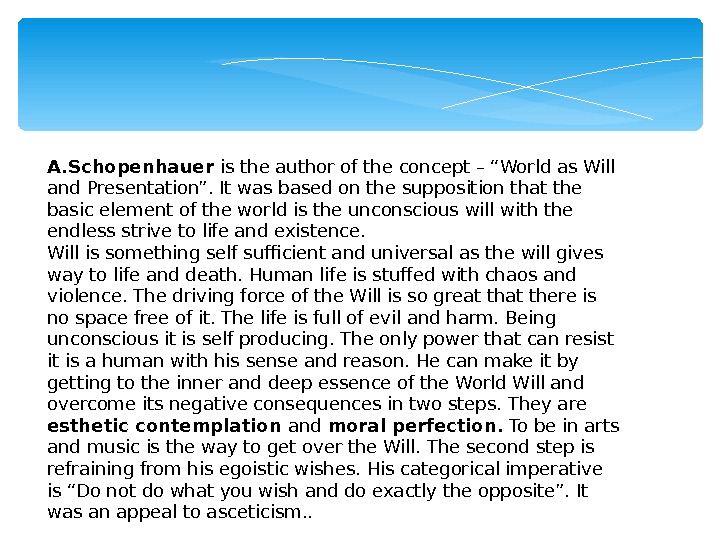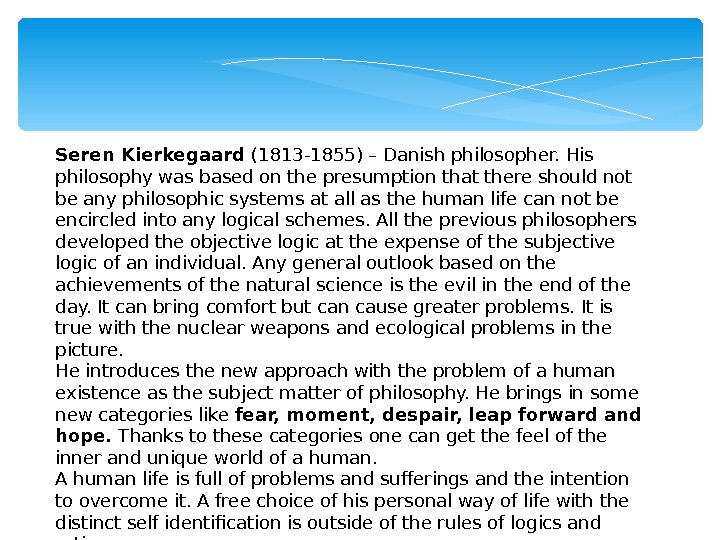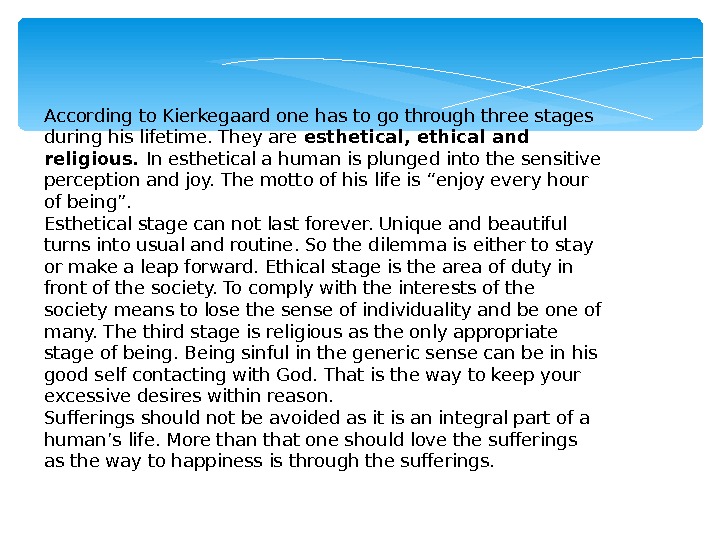Philosophy – Topic No. 10. Neoclassical Philosophy.









philosophy_of_irrationalism_topic_no.11.ppt
- Размер: 970.5 Кб
- Количество слайдов: 8
Описание презентации Philosophy – Topic No. 10. Neoclassical Philosophy. по слайдам
 Philosophy – Topic No. 10. Neoclassical Philosophy. Irrationalism. As we have learnt so far the main trend in Philosophy was the progressing rationalism as the real and fundamental base of the philosophy of the Newly Modern Times. In spite of the differences between materialism and idealism both of the streams of philosophy were supportive of the ideas and belief in the ability of a human to pave the way for the great future. But the Great French Revolution undermined all the expectations of the bourgeoisie and caused great violence and the bloodshed.
Philosophy – Topic No. 10. Neoclassical Philosophy. Irrationalism. As we have learnt so far the main trend in Philosophy was the progressing rationalism as the real and fundamental base of the philosophy of the Newly Modern Times. In spite of the differences between materialism and idealism both of the streams of philosophy were supportive of the ideas and belief in the ability of a human to pave the way for the great future. But the Great French Revolution undermined all the expectations of the bourgeoisie and caused great violence and the bloodshed.
 It eventually brought to the reconsideration of the key and basic grounds of rational philosophy (discursus – Latin – logically based judgments). It caused the search of the new forms of philosophic thinking. The leaders of this trend were the German philosopher Artur Schopenhauer and Danish thinker Seren Kierkegaard. They started the shaping of their looks with the criticism of Hegel. They were positive of all his discoveries in the area of Logics and the method of getting to the bottom of the essence. What they resolutely denied in Hegel’s philosophy was the role of a human that was confined to the position of being a vehicle of self consciousness of the Absolute idea. That is what makes his philosophy abstract. They believed that the main hero should be a human and his life with the happiness and sufferings, despair and hope. Later on in the XX century these ideas will turn into the philosophy of existentialism.
It eventually brought to the reconsideration of the key and basic grounds of rational philosophy (discursus – Latin – logically based judgments). It caused the search of the new forms of philosophic thinking. The leaders of this trend were the German philosopher Artur Schopenhauer and Danish thinker Seren Kierkegaard. They started the shaping of their looks with the criticism of Hegel. They were positive of all his discoveries in the area of Logics and the method of getting to the bottom of the essence. What they resolutely denied in Hegel’s philosophy was the role of a human that was confined to the position of being a vehicle of self consciousness of the Absolute idea. That is what makes his philosophy abstract. They believed that the main hero should be a human and his life with the happiness and sufferings, despair and hope. Later on in the XX century these ideas will turn into the philosophy of existentialism.
 A. Schopenhauer is the author of the concept – “World as Will and Presentation”. It was based on the supposition that the basic element of the world is the unconscious will with the endless strive to life and existence. Will is something self sufficient and universal as the will gives way to life and death. Human life is stuffed with chaos and violence. The driving force of the Will is so great there is no space free of it. The life is full of evil and harm. Being unconscious it is self producing. The only power that can resist it is a human with his sense and reason. He can make it by getting to the inner and deep essence of the World Will and overcome its negative consequences in two steps. They are esthetic contemplation and moral perfection. To be in arts and music is the way to get over the Will. The second step is refraining from his egoistic wishes. His categorical imperative is “Do not do what you wish and do exactly the opposite”. It was an appeal to asceticism. .
A. Schopenhauer is the author of the concept – “World as Will and Presentation”. It was based on the supposition that the basic element of the world is the unconscious will with the endless strive to life and existence. Will is something self sufficient and universal as the will gives way to life and death. Human life is stuffed with chaos and violence. The driving force of the Will is so great there is no space free of it. The life is full of evil and harm. Being unconscious it is self producing. The only power that can resist it is a human with his sense and reason. He can make it by getting to the inner and deep essence of the World Will and overcome its negative consequences in two steps. They are esthetic contemplation and moral perfection. To be in arts and music is the way to get over the Will. The second step is refraining from his egoistic wishes. His categorical imperative is “Do not do what you wish and do exactly the opposite”. It was an appeal to asceticism. .
 Seren Kierkegaard (1813 -1855) – Danish philosopher. His philosophy was based on the presumption that there should not be any philosophic systems at all as the human life can not be encircled into any logical schemes. All the previous philosophers developed the objective logic at the expense of the subjective logic of an individual. Any general outlook based on the achievements of the natural science is the evil in the end of the day. It can bring comfort but can cause greater problems. It is true with the nuclear weapons and ecological problems in the picture. He introduces the new approach with the problem of a human existence as the subject matter of philosophy. He brings in some new categories like fear, moment, despair, leap forward and hope. Thanks to these categories one can get the feel of the inner and unique world of a human. A human life is full of problems and sufferings and the intention to overcome it. A free choice of his personal way of life with the distinct self identification is outside of the rules of logics and ration.
Seren Kierkegaard (1813 -1855) – Danish philosopher. His philosophy was based on the presumption that there should not be any philosophic systems at all as the human life can not be encircled into any logical schemes. All the previous philosophers developed the objective logic at the expense of the subjective logic of an individual. Any general outlook based on the achievements of the natural science is the evil in the end of the day. It can bring comfort but can cause greater problems. It is true with the nuclear weapons and ecological problems in the picture. He introduces the new approach with the problem of a human existence as the subject matter of philosophy. He brings in some new categories like fear, moment, despair, leap forward and hope. Thanks to these categories one can get the feel of the inner and unique world of a human. A human life is full of problems and sufferings and the intention to overcome it. A free choice of his personal way of life with the distinct self identification is outside of the rules of logics and ration.
 According to Kierkegaard one has to go through three stages during his lifetime. They are esthetical, ethical and religious. In esthetical a human is plunged into the sensitive perception and joy. The motto of his life is “enjoy every hour of being”. Esthetical stage can not last forever. Unique and beautiful turns into usual and routine. So the dilemma is either to stay or make a leap forward. Ethical stage is the area of duty in front of the society. To comply with the interests of the society means to lose the sense of individuality and be one of many. The third stage is religious as the only appropriate stage of being. Being sinful in the generic sense can be in his good self contacting with God. That is the way to keep your excessive desires within reason. Sufferings should not be avoided as it is an integral part of a human’s life. More than that one should love the sufferings as the way to happiness is through the sufferings.
According to Kierkegaard one has to go through three stages during his lifetime. They are esthetical, ethical and religious. In esthetical a human is plunged into the sensitive perception and joy. The motto of his life is “enjoy every hour of being”. Esthetical stage can not last forever. Unique and beautiful turns into usual and routine. So the dilemma is either to stay or make a leap forward. Ethical stage is the area of duty in front of the society. To comply with the interests of the society means to lose the sense of individuality and be one of many. The third stage is religious as the only appropriate stage of being. Being sinful in the generic sense can be in his good self contacting with God. That is the way to keep your excessive desires within reason. Sufferings should not be avoided as it is an integral part of a human’s life. More than that one should love the sufferings as the way to happiness is through the sufferings.
 Friedrich Nietzsche (1844 -1900) has developed and modernized the notion of the World Will of A. Schopenhauer into the “will to power”. If one is not a slave he should be persistent in his strive for power. He came up with the reconsideration of the Christian morality and created his own principals: accepting the values of life as such; People are not born equal; A strong man is free of the moral obligations. He believed that it was the time to give life to a superman. It should be someone of the “nordic” origin. From the moral point of view they should be friendly with each other and absolutely free treating all the others poorly. According to the people who knew him personally he was a modest and weak man. But nonetheless put forward some reactionary ideas that were used by the fascists in their ideology. His other statement was the “God is Dead”. The Europeans have invented the science and technology so that it could upgrade a human and make him equal to the God.
Friedrich Nietzsche (1844 -1900) has developed and modernized the notion of the World Will of A. Schopenhauer into the “will to power”. If one is not a slave he should be persistent in his strive for power. He came up with the reconsideration of the Christian morality and created his own principals: accepting the values of life as such; People are not born equal; A strong man is free of the moral obligations. He believed that it was the time to give life to a superman. It should be someone of the “nordic” origin. From the moral point of view they should be friendly with each other and absolutely free treating all the others poorly. According to the people who knew him personally he was a modest and weak man. But nonetheless put forward some reactionary ideas that were used by the fascists in their ideology. His other statement was the “God is Dead”. The Europeans have invented the science and technology so that it could upgrade a human and make him equal to the God.
 By the death of God Nietzsche means the death of our belief in God. It is our belief in God that is dead. Nietzsche is famous for the Claim that the crisis of the modern world, in the loss of our belief in God, we have lost the foundation of our truth and value. However, says Nietzsche, although man has lost the belief in God, this will enable him to lose his childlike dependency upon God. Human beings must now find the courage themselves to become gods in a world without God. The greatest need of civilization now is to develop a new type of individual, supermen who will be hard, strong and courageous, and who will be intellectually and morally independent. They will break the stone slabs on which the old Judeo-Cristian moral laws are inscribed, the old life-denying moral values to which the masses are still enslaved. The only morality of the supermen will be to affirm life: to be powerful, creative, joyous, and free.
By the death of God Nietzsche means the death of our belief in God. It is our belief in God that is dead. Nietzsche is famous for the Claim that the crisis of the modern world, in the loss of our belief in God, we have lost the foundation of our truth and value. However, says Nietzsche, although man has lost the belief in God, this will enable him to lose his childlike dependency upon God. Human beings must now find the courage themselves to become gods in a world without God. The greatest need of civilization now is to develop a new type of individual, supermen who will be hard, strong and courageous, and who will be intellectually and morally independent. They will break the stone slabs on which the old Judeo-Cristian moral laws are inscribed, the old life-denying moral values to which the masses are still enslaved. The only morality of the supermen will be to affirm life: to be powerful, creative, joyous, and free.
 How did the profoundly divergent philosophies of Kierkegaard and Nietzsche prepare the way in the nineteenth century for the existentialist philosophy of the twentieth century? First, both Kierkegaard and Nietzsche, like Marx in the middle years of the nineteenth century, perceived the Western world to be approaching a time of crisis. All three, Marx, Kierkegaard, with Nietzsche, address their philosophies to the coming crisis – they offer diagnosis of their own time, and a prescription for what to be done. Second, for Kierkegaard and Nietzsche, and for existentialism which follows them, the crisis of the modern world is a problem concerning the individual, the human self. Third, Kierkegaard and Nietzsche prepare the way for existentialism, all past philosophies as having shown no interest in philosophizing about the existence of the human individual and no interest in the effect of philosophy upon his consciousness.
How did the profoundly divergent philosophies of Kierkegaard and Nietzsche prepare the way in the nineteenth century for the existentialist philosophy of the twentieth century? First, both Kierkegaard and Nietzsche, like Marx in the middle years of the nineteenth century, perceived the Western world to be approaching a time of crisis. All three, Marx, Kierkegaard, with Nietzsche, address their philosophies to the coming crisis – they offer diagnosis of their own time, and a prescription for what to be done. Second, for Kierkegaard and Nietzsche, and for existentialism which follows them, the crisis of the modern world is a problem concerning the individual, the human self. Third, Kierkegaard and Nietzsche prepare the way for existentialism, all past philosophies as having shown no interest in philosophizing about the existence of the human individual and no interest in the effect of philosophy upon his consciousness.

